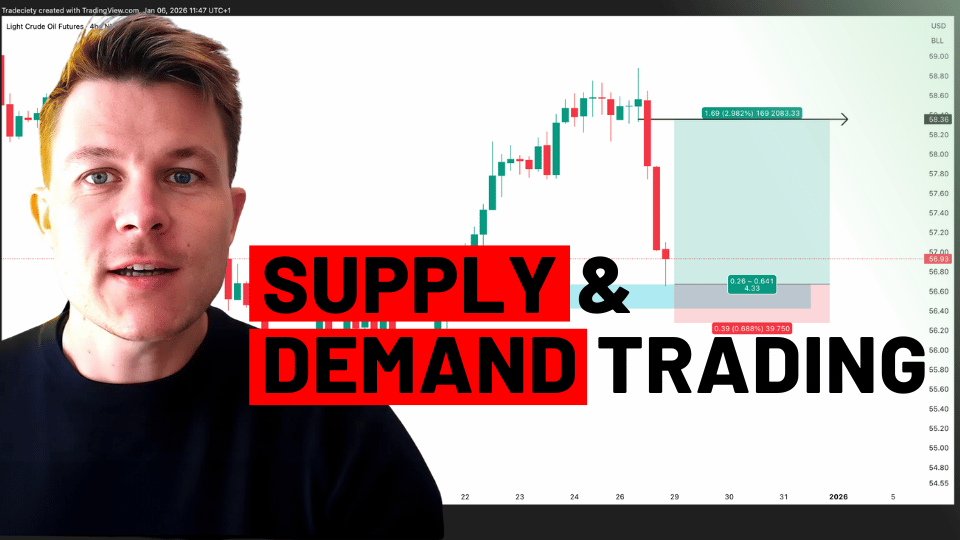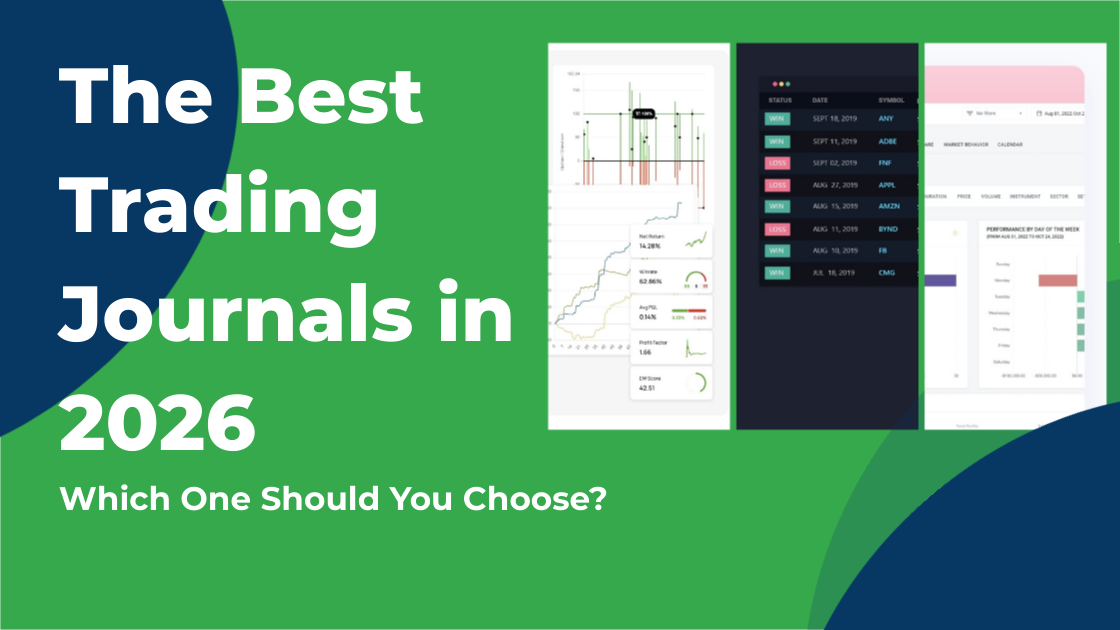Supply and Demand Trading in 2026
We have been trading supply and demand strategies for over ten years, and they have stood the test of time remarkably well. Supply and demand is...

Let me make a blunt statement which is 100% true:
All trading issues and all trading failures are caused by emotions.
When a trader fails, it is never because they read charts incorrectly, but because they have flaws in their trading psychology.
And when it comes to specific trading issues and failures, the points below account for the majority of problems traders deal with on a daily basis:
I am willing to bet that if your results are not what you want them to be, it is not because you are using a wrong moving average or because you draw your support/resistance levels the wrong way, but because one or more of the previously listed issues are causing your trading mistakes and are, therefore, responsible for your failure.
Ok, so the next question is: what are we going to do about those issues and how can traders overcome their problems? Stick with me, we are getting there…
The conventional approach to trading psychology, where traders just talk about fear and greed on a surface level is outdated and not very practical. Why? Because the real problems go many levels deeper.
Let’s look at the example of fear. “Fear” is a very dominant emotion many traders experience in their trading on a regular basis. But fear comes in many different forms. And, more importantly, fear can have many different causes.
A trader can have a fear of losing. It doesn’t help if you just tell the trader that losing is a normal part of trading or the cost of doing business. No trader was every cured of fear of losing by repeating such meaningless phrases. He might already understand this but the fear of losing usually has very different origins.
For example, the trader could lack confidence in his trading strategy. Maybe he just picked up a random strategy somewhere and never validated it. Of course, risking real money is then scary and causes fear.
Or the trader knows that he didn’t put in the work, doesn’t approach trading with the seriousness it deserves and, therefore, experiences fear when trading because deep down he has the belief that you need to work for your money and nothing comes easy.
Or the trader has unrealistic expectations of doubling his account every few months. Of course, when reality catches up and the trader realizes that his expectations are not met, this can create fear when he suddenly realizes that his idea of trading cannot be reached.
Or, the trader does not have a system, to begin with, and does not have rules at all and all the trades he enters are completely random – experiencing fear is a normal reaction in such a situation, wouldn’t you agree?
Or, the trader came up with an arbitrary performance goal and he wants to realize 5% a week. When the trader is stuck in a drawdown and puts too much pressure on himself to reach such random goals, fear could also be the natural result.
Fear is, therefore, just the surface level emotion and there are root-causes and other issues at least 2 or 3 levels deeper than your general fear response.
I could go on with examples of how fear can be created forever, but I think you get the point. Simply saying that “fear” is your biggest issue doesn’t quite cut it. You need to go at least 1 or 2 levels deeper to find out what the real issue is. Because only then can you work on the real cause and develop a plan for overcoming the root cause.
You cannot just work on trying to overcome “fear” itself because you may not even know what is causing your fear. This is, by the way, what 99% of traders and trading education suggests. But simply trying to just not be fearful does not work – as you probably know by now if you have tried such an approach in the past. But once you go a few levels deeper and uncover why you are experiencing fear, it is relatively easy to work on it.
The next thing conventional trading education gets wrong is that it suggests that you need to eliminate emotions and trade like a robot. This could not be further from the truth. And following such advice can actually be very dangerous.
Needless to say that it does not work anyway as the 99% failure rate of traders indicates. We are humans and emotions are a very important part of our being. Of course, we cannot suppress our emotions. We are not built like this and trying to force such an approach onto us will just lead to a lot of stress and frustration – emotions that weren’t there before, but you have artificially created them by trying to suppress emotions.
The good news is that there is a way out.
And the first step is simply noticing when a certain emotion – or just a strong feeling – comes up. Most traders are either numb to their feelings because of all the stress that goes on around them, or they try to shut their feelings off and just push through it. Obviously, this is not very helpful and eventually, all your built-up emotions will find a release that usually ends ugly.
So, next time you feel uneasy, just notice it. Write down when it happens, what you were about to do and how it felt. This way, your emotions actually develop a helpful role in your trading because you can use them to identify potential shortcomings or areas you need to work on.
If you constantly feel uneasy when you are in a trade and the price pulls against you, investigate it further. There might be a major lesson waiting for you!
What’s the reason behind this feeling? Is your position too big? You don’t have rules for your trade management and just don’t know what to do? Maybe you never even looked at natural price behavior after your entry and you need to go back through your past trade screenshots and audit what is likely to happen once you are in a trade. Of course, there could be many more reasons for your feelings. But the idea is that you really listen to your feelings and to your internal self-talk in those situations to identify the main issue. This is the most reliable way to overcome all emotional related trading issues.
A great book in this context is “Awareness” by Anthony de Mello.
And then suddenly you can start appreciating your emotions because they are (1) like an early warning system and (2) they can help you improve your trading in areas you previously neglected.
I talked about uncertainty many times before, but it fits perfectly in this context.
Many traders can reduce the amount of emotional related trading problems by simply removing uncertainty. 99% of all traders spend all their time on trade entries and completely neglect everything else. Of course, uncertainty is then the logical result.
Such traders do not know how to place stops and targets in certain market conditions. The traders did not look into consistent position sizing principles. The traders lack an understanding when it comes to managing trades and dealing with pullbacks. The traders do not know how to handle the news. The traders may not even understand the entry criteria they are using because they are jumping around all the time in the pursuit to find the “perfect” entry system while neglecting all other aspects of their trading strategy.
Uncertainty leads to a lack of confidence which then leads to fear. By removing uncertainty, you can cure many trading-related problems.
In order for you to do that, you need to become crystal clear about your whole approach to trading and you need to define all areas of it.
That and many more exercises build the foundation of our 5-month “Treat your trading like a business” course.
The list goes on. In the end, you will define every aspect of your trading and you have defined rules and principles for everything that could happen. Of course, in the beginning, the rules may not be perfect, but it is still better than blindly jumping around. Over time, you can then make targeted adjustments based on your findings and based on what your emotions tell you. This is the surest way of removing uncertainty and overcoming fear related issues.
By the way, how did you react to this approach? Did you tell yourself that you do not need this? Do you think that it is too much work? And do you believe that you just need to find a better system?
In over 10 years, I have never met a successful trader who is not crystal clear about all of those points. Profitable traders approach their trading with the seriousness it deserves and they understand that they can’t leave things to chance.
Do you really expect to put food on your table, provide a good lifestyle for your spouse, pay for your kids’ education and build a retirement plan, while you are system hopping, not having written down your trading plan and just hunting Millions by going through countless trading systems? How you answer this question will undoubtedly determine the course of your life and the level of success you will have. It is 100% in your hands and you decide how serious you are about this…
Although there are many more cures for trading psychology issues, I want to limit it to the 3 main ones for this article. If a trader can really put those to work, he may already see major improvements in his overall approach and confidence levels.
One of my most-liked tweets of all time goes like: “Traders say that they want to have a long trading career and trade for a living, but then actually trade like they have to retire tomorrow.”
Adopting a long-term approach to trading – and to all other areas where you are striving for lasting success – is the key. It also makes things MUCH easier.
A trader who really accepts that he is setting up his trading career for the next 10 or 20 years will act very differently compared to a trader who just wants to make a quick Million within a few months. Of course, the second trader will over-leverage, take way too much risk, trade too much, have unrealistic expectations and only live for the short term. Inevitably, this will lead to a disaster, margin calls and a lot of frustration. His trading approach has nothing to do with professional trading anymore.
But how will your outlook shift if you really accept that you are in this for the next 20 years? Couldn’t you set aside a few years just to learn the foundation, build your professional routine and really work on yourself and on your trading strategy without artificial pressure and without looking for shortcuts that never work? You will experience less stress, you can enjoy the process more and you will actually have a real chance to succeed.
You can see this in any field. The ones at the top are always the ones who have put in the time. The so-called overnight successes have worked for years, or sometimes even decades, behind the scenes before any taste of success. They lay a solid groundwork without pressure and they just perfected their craft.
I understand that this is a hard pill to swallow for many, but I am not here to tell you what you want to hear. I am giving you the only way out. There is no other way to reach sustainable success. And deep down you know it, right?
Cultivating patience is a skill that will serve you in all areas of your life. And for as long as you live. Fight the temptations of instant gratification and move towards a delayed gratification mindset. It will make success achievable. And you will cure many issues that are related to trading psychology automatically.
You can use all the principles and tips in the article on your own and you will see a huge improvement already.

We have been trading supply and demand strategies for over ten years, and they have stood the test of time remarkably well. Supply and demand is...

3 min read
Choosing the right trading journal is essential for traders wanting to analyze performance, refine strategies, and improve consistency. In this...

3 min read
“95% of all traders fail” is the most commonly used trading related statistic around the internet. But no research paper exists that proves this...